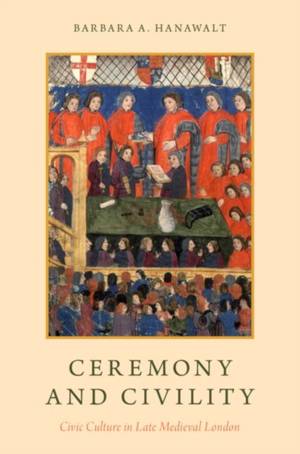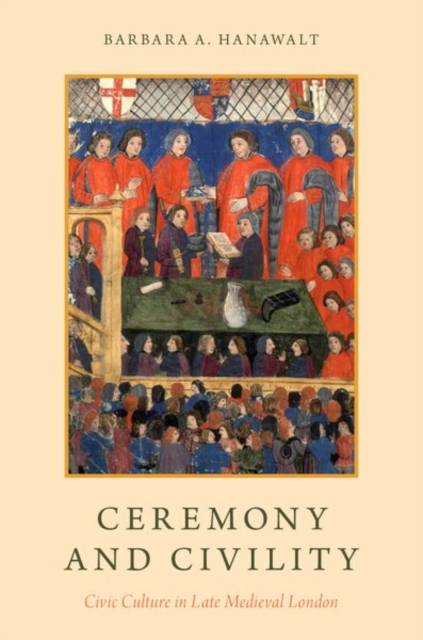
- Afhalen na 1 uur in een winkel met voorraad
- Gratis thuislevering in België vanaf € 30
- Ruim aanbod met 7 miljoen producten
- Afhalen na 1 uur in een winkel met voorraad
- Gratis thuislevering in België vanaf € 30
- Ruim aanbod met 7 miljoen producten
Omschrijving
Medieval London, like all premodern cities, had a largely immigrant population-only a small proportion of the inhabitants were citizens-and the newly arrived needed to be taught the civic culture of the city in order for that city to function peacefully. Ritual and ceremony played key roles in this acculturation process. In Ceremony and Civility, Barbara A. Hanawalt shows how, in the late Middle Ages, London's elected officials and elites used ceremony and ritual to establish their legitimacy and power.
In a society in which hierarchical authority was most commonly determined by inheritance of title and office, or sanctified by ordination, civic officials who had been elected to their posts relied on rituals to cement their authority and dominance. Elections and inaugurations had to be very public and visually distinct in order to quickly communicate with the masses: the robes of office needed to distinguish the officers so that everyone would know who they were. The result was a colorful civic pageantry.
Newcomers found their places within this structure in various ways. Apprentices entering the city to take up a trade were educated in civic culture by their masters. Gilds similarly used rituals, oath swearing, and distinctive livery to mark their members' belonging. But these public shows of belonging and orderly civic life also had a dark side. Those who rebelled against authority and broke the civic ordinances were made spectacles through ritual humiliations and public parades through the streets so that others could take heed of these offenders of the law.
An accessible look at late medieval London through the lens of civic ceremonies and dispute resolution, Ceremony and Civility synthesizes archival research with existing scholarship to show how an ever-shifting population was enculturated into premodern London.
Specificaties
Betrokkenen
- Auteur(s):
- Uitgeverij:
Inhoud
- Aantal bladzijden:
- 248
- Taal:
- Engels
Eigenschappen
- Productcode (EAN):
- 9780190490409
- Verschijningsdatum:
- 25/07/2017
- Uitvoering:
- Paperback
- Formaat:
- Trade paperback (VS)
- Afmetingen:
- 155 mm x 231 mm
- Gewicht:
- 362 g

Alleen bij Standaard Boekhandel
Beoordelingen
We publiceren alleen reviews die voldoen aan de voorwaarden voor reviews. Bekijk onze voorwaarden voor reviews.









